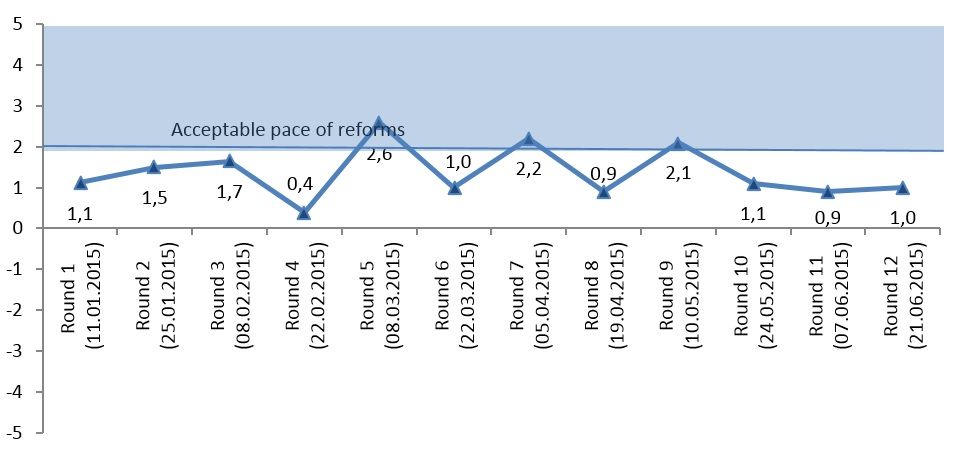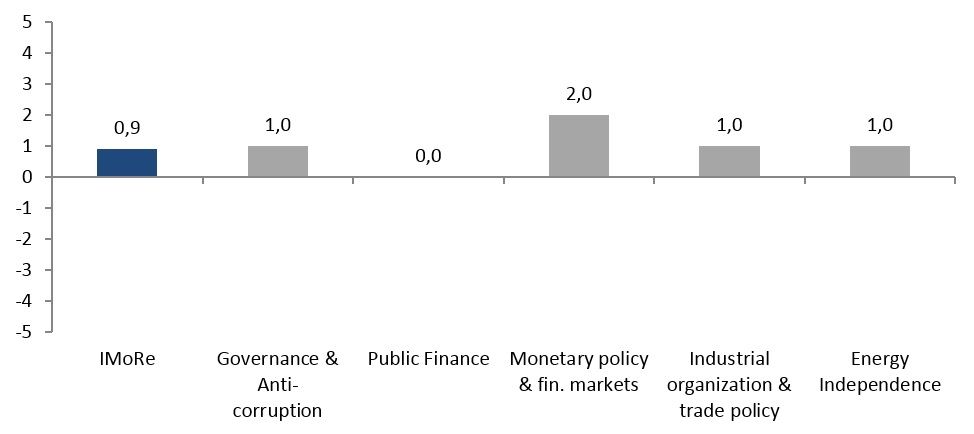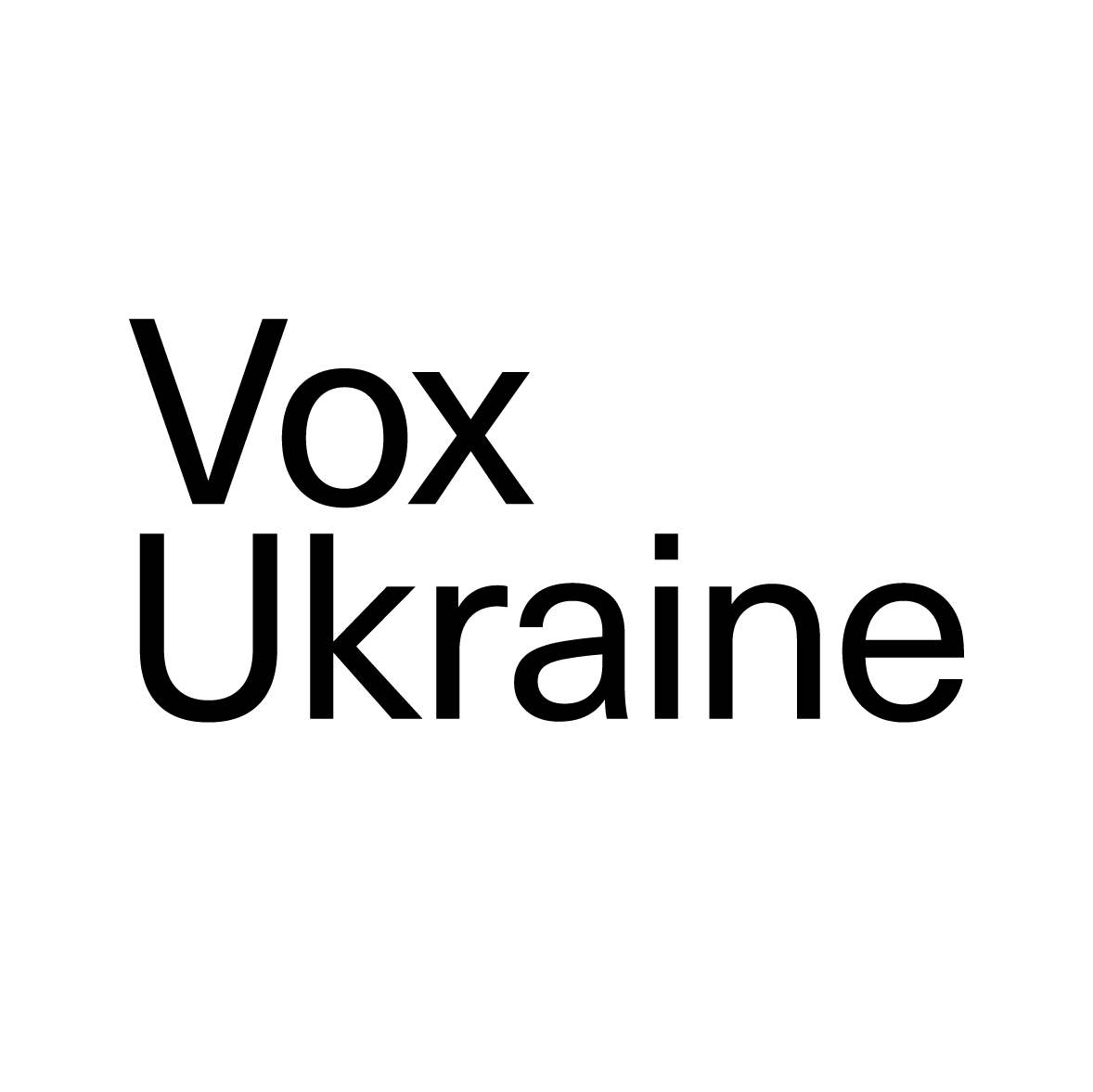Reform Index aims to provide a comprehensive assessment of reform efforts by Ukraine’s authorities. The Index is based on expert assessments of changes in the regulatory environment in five areas.
Reform Index value for the 12th monitoring period (June 8th – 21st, 2015) stood at +1.1 points. This is out of a possible range from -5.0 to +5.0 points. The pace of reforms has been disappointingly slow for three consecutive periods. The only exception has been monetary policy, which has seen gradual progress.
Chart 1. Reform Index dynamics

Chart 2. Reform Index and its components in the current round
The total grade for “Monetary policy and financial markets” sub-index reached +2.0 points. The highest score in the 12th monitoring period (+2.8 points) was awarded to the National Bank of Ukraine’s (NBU) decree on tightening the requirements to business reputation of banks’ substantial shareholders and CEOs . With the same decree, the NBU cancelled some outdated and unnecessary requirements, for example, the requirement to nostrificate diplomas issued by EU universities. Lifting of the military duty from currency exchange operations received +2.0 points, since this tax was inefficient and contributed to the shadow FX market development. Experts awarded +1.8 points to simplification of capital registration for banks with investment-level credit rating, as this is a step towards deregulation of the sector. Finally, experts assigned +1.5 points to the NBU decision to allow early repayment of banks shareholders’ deposits that are converted into capital.
Three more sub-indices (Governance and Anti-corruption, Monetary Policy and Financial Markets and Energy Independence) received + 1.0 points each.
Within the Governance and Anti-corruption sector, the law on strengthening the responsibility for precluding the work of journalists scored +1.5 points, although some experts are afraid that the severity of the law will be offset by its poor enforcement. Another +1.5 points were awarded to the law on defining property rights in multi-apartment buildings. The law regulates exercising property rights of apartment owners and some issues of building management, but its overall effect is only slightly positive because the law leaves a number of issues unresolved.
The approval of the selection board for the National Agency for Corruption Prevention (NACP) received polar grades – from +2 for the mere fact of the board approval to -5 for the selection procedure, in particular, selection of NGO representatives. As Dmytro Kotlyar from RPR notes, “Selection of the selection board members from civil society organizations was held with violations of the law. The Cabinet of Ministers staff did not fulfil their responsibilities and did not check whether the NGOs [that provided their candidates] have a real experience in anti-corruption sphere. Civil society representatives are challenging the selection results in court. The selection process was discredited before it even started, and this can seriously [negatively] affect the NACP efficiency”. The final score of this event was 0.0 points.
In Industrial Organization and Trade Policy sector the highest grade (+1.3 points) was awarded to the law stating that the Antimonopoly Committee will approve granting assistance to the state-owned enterprises. This development will positively impact the competitive environment in the country; however since it comes into force only in 2019, its importance at the moment is low. Approval of the list of devices that need to be periodically calibrated, and cancelling the requirement to declare regional grain resources received +1.0 points each.
In Energy Independence sector, a law stating that the government should approve tariffs which are below the economically justified level received +1.0 points, since the difference between the tariffs is covered from the budget, for which the government is responsible. However, experts noted that the concept of “economically justified tariffs” is rather vague.
Chart 3. Value of Reform Index components and number of events June 8–21, 2015
Finally, experts estimated progress in public finance sector at zero. Laws that strengthen social protection of servicemen and low-income families scored +1.0 points each, while the decision to exempt religious organizations from property tax received -1 points. In general, experts noted that the country needs comprehensive reform of the social security system rather than some discretionary solutions.
Reform Index aims to provide a comprehensive assessment of reform efforts by Ukraine’s authorities. The Index is based on expert assessments of changes in the regulatory environment in five areas:
- Governance and Anti-Corruption
- Public Finance and Labor Market
- Monetary Policy and Financial Markets
- Industrial Organization and Foreign Trade
- Energy Independence
For details please visit reforms.voxukraine.org

Attention
The author doesn`t work for, consult to, own shares in or receive funding from any company or organization that would benefit from this article, and have no relevant affiliations





